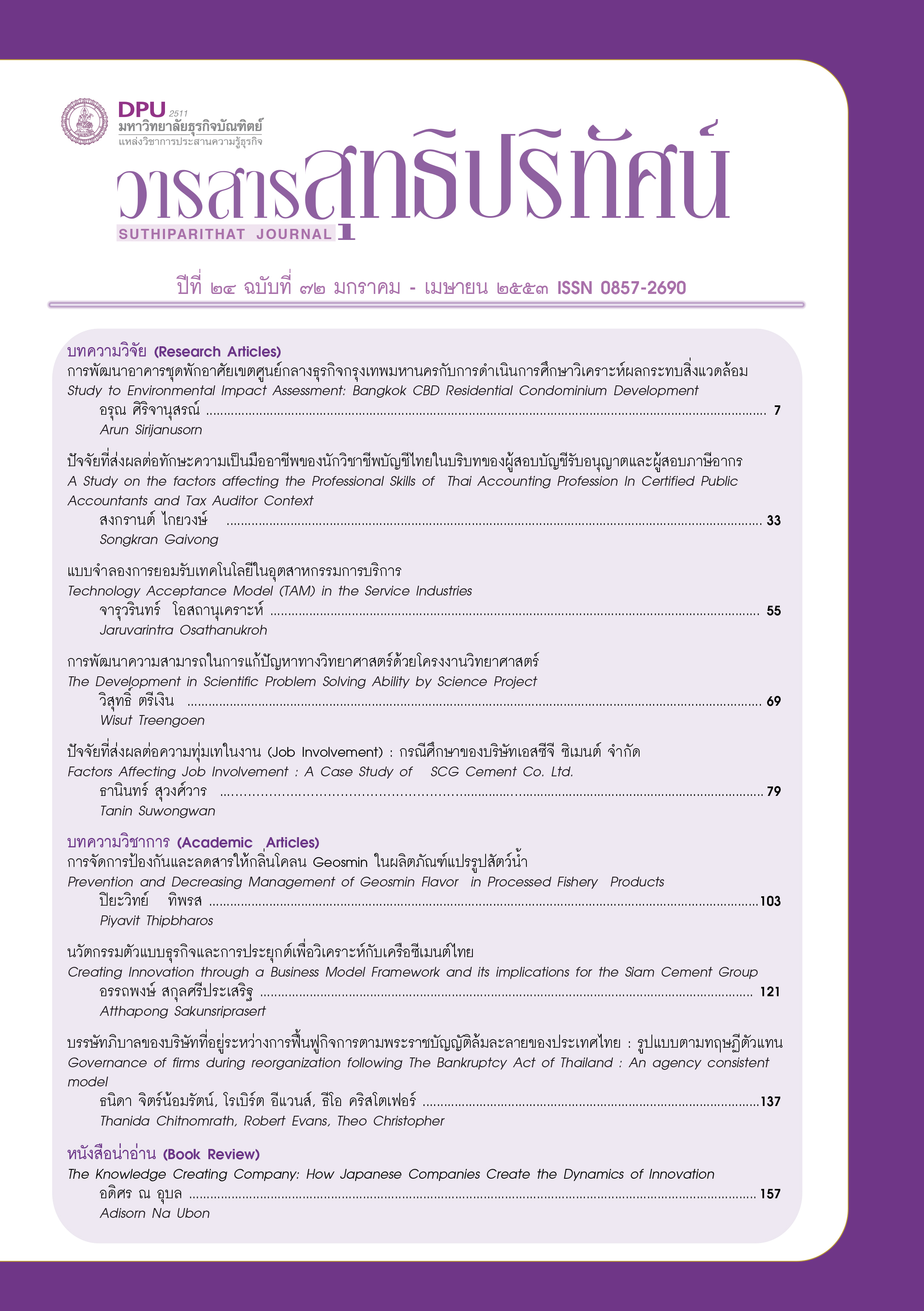ปัจจัยที่ส่งผลต่อความทุ่มเทในงาน (Job Involvement) : กรณีศึกษาของบริษัทเอสซีจี ซิเมนต์จำกัด
คำสำคัญ:
ลักษณะผู้นำแบบปฏิรูป, ลักษณะงาน, การเสริมพลังอำนาจภายใน, ความทุ่มเทในงานบทคัดย่อ
วัตถุประสงค์ของการศึกษาครั้งนี้เพื่อวิเคราะห์ความสัมพันธ์เชิงสาเหตุ (model testing) ระหว่างลักษณะผู้นำแบบปฏิรูป (transformational leadership) และลักษณะงาน (job characteristics) กับการเสริมพลังอำนาจภายใน (psychological empowerment) ซึ่งเป็นตังแปรกลาง (mediating variable) ที่ส่งผลต่อความทุ่มเทในงาน (job involvement)
ผลการศึกษาพบว่าโมเดลที่นำเสนอสอดคล้องกับข้อมูลเชิงประจักษ์ สรุปได้ว่าโมเดลที่ได้นี้มีความสามารถในการวัดได้ดีและยอมรับได้ นอกจากนี้ยังพบว่าลักษณะผู้นำแบบปฏิรูปมีความสัมพันธ์โดยตรงต่อความผูกพันในงานแต่ไม่ส่งผลต่อการเสริมพลังอำนาจภายใน ลักษณะงานมีความสัมพันธ์โดยตรงต่อการเสริมพลังอำนาจภายในแต่ไม่ส่งผลต่อความทุ่มเทในงาน และการเสริมพลังอำนาจภายในมีความสัมพันธ์โดยตรงต่อความทุ่มเทในงานและเป็นตัวเชื่อม (Mediating variable) ระหว่างลักษณะงานและความทุ่มเทในงาน
เอกสารอ้างอิง
Allport, Gordon W. 1943. The Ego in Contemporary Psychology. Psychological Review. 50: 451-476.
Arbuckle, J. J. 1995. AMOS User’s Guide. Chicago: Small Waters Corporation.
Ashforth, B. E. 1989. The Experience of Powerlessness in Organizations. Organizational Behaviour and Human Decision Processes. 43: 207-242.
Antonakis, J., Avolio, B., & Sivassubramaniam, N. (2003). Context and leadership: An examination of the nine-factor full range leadership theory using the multifactor leadership questionnaire. The Leadership Quarterly, 14 (2003), 261-295.
Avolio, B.J., Bass, B., Walumbwa, F., & Zhu, W. 2004a. Multifactor Leadership Questionnaire: Manual and sampler test (3rd ed.). Redwood City, CA: Mind Garden.
Avolio, B. J.; Zhu, W.; Koh, W. & Bhatia, P. 2004b. Transformational Leadership and Organisational Commitment: Mediating Role of Psychological Empowerment and Moderating Role Structural Distance. Journal of Organizational Behaviour. 25: 951-968.
Bandura, A. 1986. Social Foundations of Thought and Action: A Social Cognitive Theory. Englewood Cliffs, N.J.: Prentice-Hall.
Bass, B. M 1985. Leadership and Performance Beyond Expectations. New York: The Free Press.
Bass, B. N. 1997. Does the Transactional-Transformational Leadership Paradigm Transcend Organisational and National Boundaries. American Psychologist. further research should adopt a longitudinal design in order to establish any causal relationships between the research variables which have been tested in this study.
Bass, B. M. & Avolio, B. J. 1994. Improving Organizational Effectiveness Through Transformational Leadership. Thousand Oaks, C.A.: Sage.
Bass, B M & Avolio, B.J. 1995. Multifactor Leadership Questionnaire Distributed by Mind Garden, Inc.,
Burns, James M. 1978. Leadership. New York: Harper & Row.
Conger, J. A. & Kanungo, R. N. 1988. The Empowerment Process: Integrating Theory and Practice. Academy of Management Review. 13: 471-482.
Dubin, R. 1956. Industrial Workers’ World: A Study of the ‘Central Life Interests’ of Industrial Workers. Social Problems. 3: 131-42.
Dvir, T. Eden, D.; Avolio, B. J. & Shamir, B. 2002. Impact of Transformational Leadership on Follower Development and Performance: A Field Experiment. Academy of Management Journal. 45: 735-744.
Dewettinck, Koen, Singh, Jagdip, Buyens, Dirk. 2003 Psychological Empowerment in the Workplace: Reviewing the Empowerment Effects on Critical Work Outcomes. Working Paper. Ghent University
Guimaraes, Tor. 1996. TQM’s Impact on Employee Attitudes. The TQM Magazine. 8 (1): 20-25.
Hackman, J. R. & Oldham, G. 1976. Motivating Through the Design of Work: Test of a Theory. Organizational Behavior and Performance. 16: 250-279.
Hackman, J. R. & Oldham, G. 1980. Work Redesign. Addison-Wesley Publishing Company, Inc.
Hertzberg, F. Mausner, B. & Snyderman, B. 1959. The Motivation to Work. 2nd ed. John Wiley. New York.
Kanlaya Wanichbuncha. 2003. Advance Statistic for SPSS. Bangkok: Chulalongkorn University Publishing.
Thipparat Klansakul, 2004 Relationships between transformational leadership of head nurse, job involvement, and nursing team effectiveness as perceived by staff nurses, general hospitals, central region , Thesis, Chulalongkorn University.
Joreskog, K. G. & Sorbom, D. 1993. Lisrel 8: Structural Equation Modeling with the Simplis Command Language. Chicago: Software International : 26
Kanlaya Wanichbuncha. 2003. Advance Statistic for SPSS. Bangkok: Chulalongkorn University Publishing.
Kanter, R. M. 1977. Men and Women of the Corporation. New York: Basic Books.
Kanungo, R. N. 1982. Measurement of Job and Work Involvement. Journal of Applied Psychology. 67: 341-349.
Kark, R.; Shamir, B. & Chen, G. 2003. The Two Faces of Transformational Leadership: Empowerment and Dependency. Journal of Applied Psychology. 88 (2): 246-255.
Koberg, C. S.; Boss, W.; Senjem, J. C. & Goodman, E. A. 1999. Antecedents and Outcomes of Empowerment: Empirical Evidence from the Health Care Industry. Group and Organization Management. 34 (1): 71-91.
Kraimer, M. L.; Seibert, S. E. & Liden, R. C. 1999. Psychological Empowerment as a Multidimensional Construct: A Test of Construct Validity. Educational and Psychological Measurement. 59: 127-142.
Lawshe, C.H. 1975. A Qualitative Approach to Content Validity Personnel Psychology 563-575
Lawler, E. E. & Hall, D. T. 1970. Relationships of Job Characteristics to Job Involvement, Satisfaction and Intrinsic Motivation. Journal of Applied Psychology. 54: 305-312.
Liden, R.C.; Wayne, S.J. & Sparrowe, R.T. 2000. An Examination of the Mediating Role of Psychological Empowerment on the Relations between the Job, Interpersonal Relationships and Work Outcomes. Journal of Applied Psychology. 85 (3): 407-416.
Lodahl, T. & Kejner, M. 1965. The Definition and Measurement of Job Involvement. Journal of Applied Psychology. 49: 24-33.
Martinko,M.J.,& Gardner,W.L, (1982). Learned helplessness: An alternative explanation for performance deficits. Academy of Management Review, 7: 195-204.
Rabinowitz, S. & Hall, D. T. 1977. Organizational Research on Job Involvement. Psychological Bulletin. 84 (2): 265-288.
Reeve, Charlie; Smith, L. & Carlla, S. 2001. Refining Lodahl and Kejner’s Job Involvement Scale with a Convergent Evidence Approach: Applying Multiple Methods to Multiple Samples. Organizational Research Methods. 4: 91.
Robbins, P Stephen P. 2005 Organization Behaviour. The 11th edition. New Jersey. Prentice Hall.
Robbins, P Stephen P. and Judge Timothy A, 2007 Organization Behaviour. New Jersey. Prentice Hall.
Seibert, S. E.; Silver, S. R. & Randolph, W. A. 2004. Taking Empowerment to the Next Level: A Multiple-Level Model of Empowerment, Performance and Satisfaction. Academy of Management Journal. 47 (3): 332-349.
Sparrowe, R. 1994. Empowerment in the Hospitality Industry: An Exploration of Antecedents and Outcomes. Hospitality Research Journal. 17: 51-73.
Spreitzer, Gretchen M. 1995. Psychological Empowerment in the Workplace: Dimensions, Measurment and Validation. Academy of Management Journal. 38 (5): 1442-1465.
Salina Taweewatthanakijborworn, Effects of Job Characteristics and Social Structural Characteristics on Psychological Empowerment. Thesis. Faculty of Liberal Arts, Department of Industrial and Organization Psychology. Thammasart University.
Tiparat Klansakul, 2004 Relationships between Transformational Leadership of Head Nurse, Job Involvement, and Nursing Team Effectiveness as Perceived by Staff Nurses, General Hospital, Central Region. Thesis, Faculty of Nursing, Chulalongkorn University
ดาวน์โหลด
เผยแพร่แล้ว
รูปแบบการอ้างอิง
ฉบับ
ประเภทบทความ
สัญญาอนุญาต
เนื้อหาและข้อมูลในบทความที่ลงตีพิมพ์ในวารสารสุทธิปริทัศน์ ถือเป็นข้อคิดเห็นและความรับผิดชอบของผู้เขียนบทความโดยตรงซึ่งกองบรรณาธิการวารสาร ไม่จำเป็นต้องเห็นด้วย หรือร่วมรับผิดชอบใด ๆ
บทความ ข้อมูล เนื้อหา รูปภาพ ฯลฯ ที่ได้รับการตีพิมพ์ในวารสารสุทธิปริทัศน์ ถือเป็นลิขสิทธิ์ของวารสารสุทธิปริทัศน์หากบุคคลหรือหน่วยงานใดต้องการนำทั้งหมดหรือส่วนหนึ่งส่วนใดไปเผยแพร่ต่อหรือเพื่อกระทำการใด ๆ จะต้องได้รับอนุญาตเป็นลายลักษณ์อักษรจากวารสารสุทธิปริทัศน์ก่อนเท่านั้น







